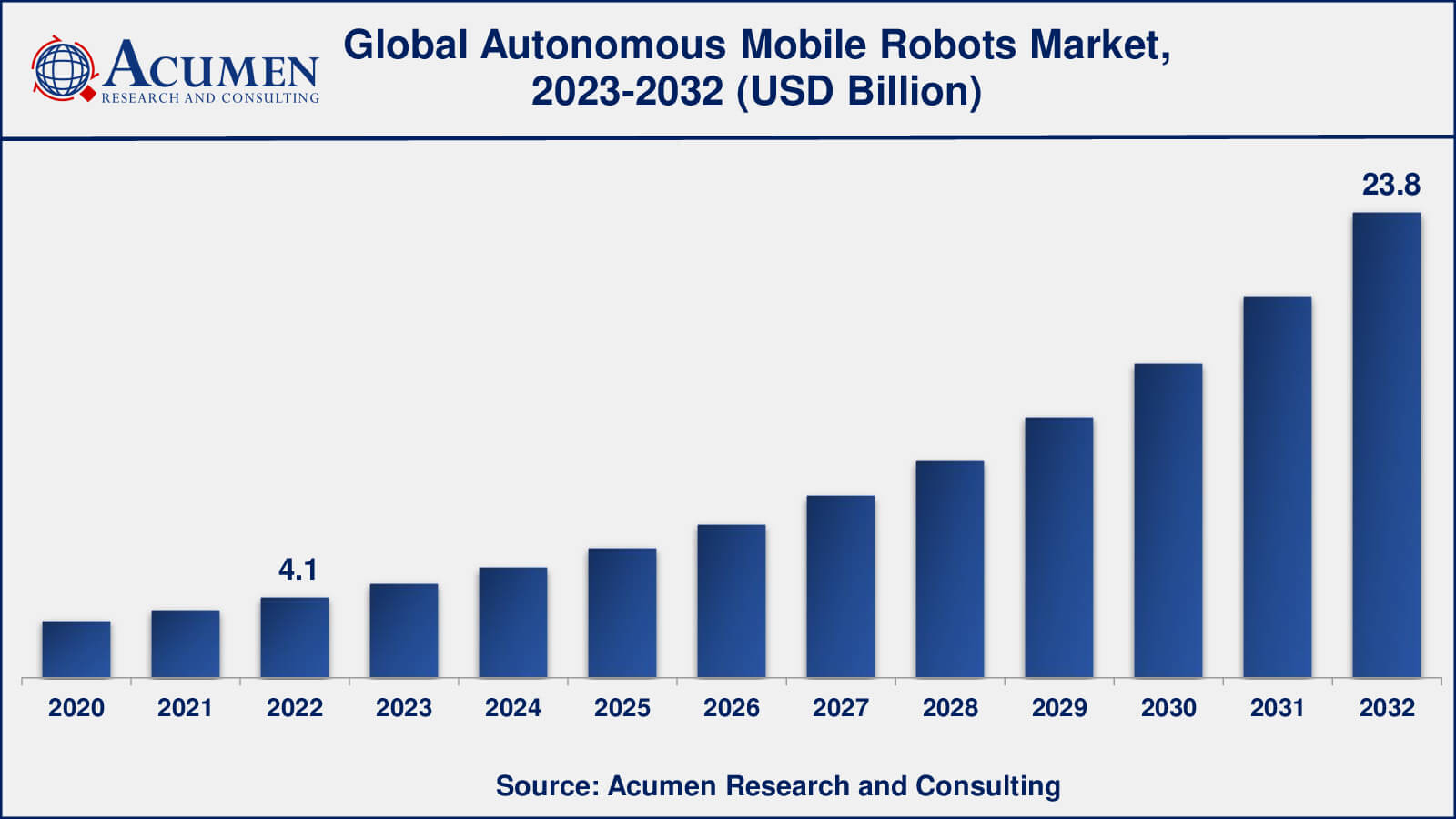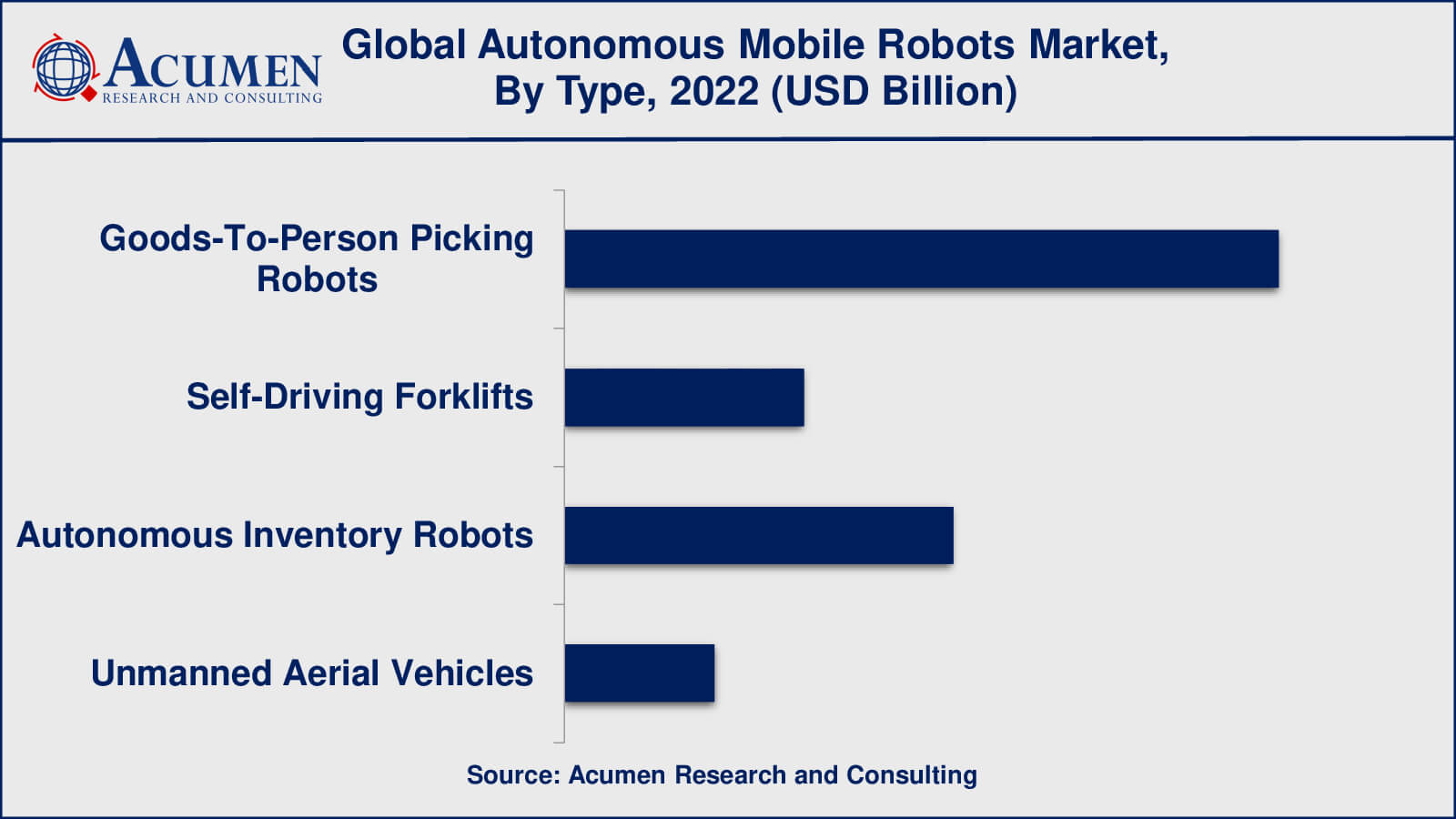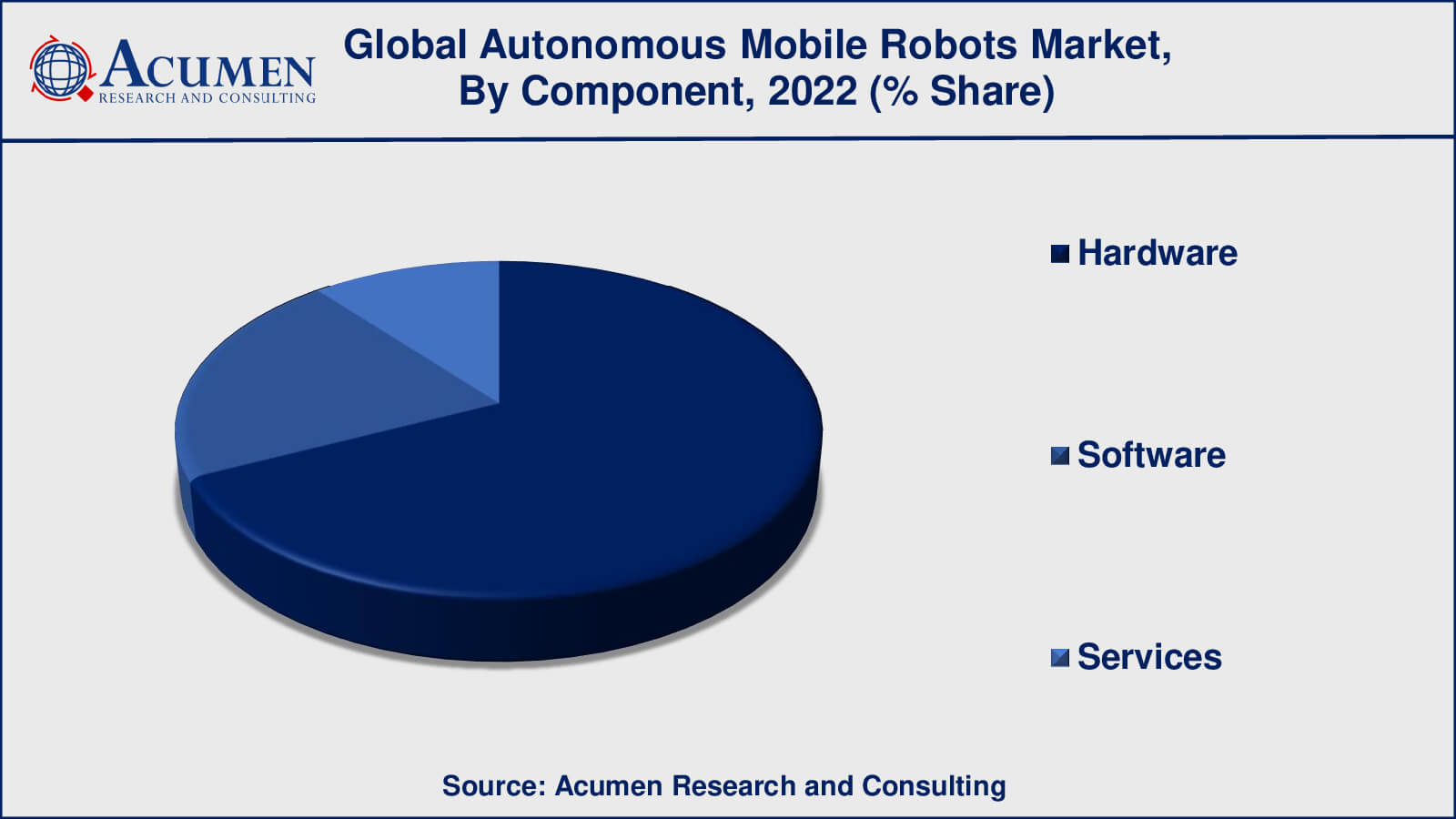Autonomous Mobile Robots Market Size - Global Industry, Share, Analysis, Trends and Forecast 2023 - 2032
Published :
Report ID:
Pages :
Format :
Autonomous Mobile Robots Market Size - Global Industry, Share, Analysis, Trends and Forecast 2023 - 2032
Report Coverage
- Industry Dynamics
- Market Size and Forecast Data
- Segment Analysis
- Competitive Landscape
- Regional Analysis with a Niche Focus on Country-Level Data
- High Level Analysis - Porter's, PESTEL, Value Chain, etc.
- Company Profiles of Key Players
- Option to Customize the Report As Per Your Specific Need
Request Sample Report
The Global Autonomous Mobile Robots Market Size accounted for USD 4.1 Billion in 2022 and is estimated to achieve a market size of USD 23.8 Billion by 2032 growing at a CAGR of 19.5% from 2023 to 2032.
Autonomous Mobile Robots Market Highlights
- Global autonomous mobile robots market revenue is poised to garner USD 23.8 billion by 2032 with a CAGR of 19.5% from 2023 to 2032
- Europe autonomous mobile robots market value occupied around USD 1.3 billion in 2022
- Asia-Pacific autonomous mobile robots market growth will record a CAGR of more than 20% from 2023 to 2032
- Among type, the goods-to-person picking robots sub-segment generated over US$ 2 billion revenue in 2022
- Based on component, the hardware sub-segment generated around 68% share in 2022
- Increasing adoption of edge computing and connectivity is a popular autonomous mobile robots market trend that fuels the industry demand

Autonomous mobile robots (AMRs) are composed of both software and hardware components. These robots are designed to carry out tasks independently, without human intervention. They are equipped with advanced features like navigation, mapping, localization, and locomotion. AMRs find applications in a wide range of activities such as transportation, inspection, and surveillance.
Various industries benefit from the use of AMRs, including military services, mining & metals, electronics & electrical sectors, oil & gas, and automotive. These robots have the capability to perform diverse operations without relying on human assistance. When encountering obstacles while carrying out tasks, AMRs have the ability to detect them and autonomously adjust their routes. This flexibility allows the robots to adapt to changing task requirements and ensure efficient completion.

Global Autonomous Mobile Robots Market Dynamics
Market Drivers
- Increasing application of autonomous mobile robots in different industrial sectors
- Growing demand for autonomous robots systems
- Need for efficient and flexible material handling and logistics solutions
- Expansion of e-commerce and the need for optimized warehouse operations
Market Restraints
- High installation cost of autonomous mobile robots
- Safety and security issue of robots
- High capital requirements
Market Opportunities
- High demand for warehouse automation from emerging countries
- The adoption of Industry 4.0 in logistics and warehousing
- Development of collaborative robots for human-robot interaction
- Adoption of service-based business models, such as robot-as-a-service (RaaS)
Autonomous Mobile Robots Market Report Coverage
| Market | Autonomous Mobile Robots Market |
| Autonomous Mobile Robots Market Size 2022 | USD 4.1 Billion |
| Autonomous Mobile Robots Market Forecast 2032 | USD 23.8 Billion |
| Autonomous Mobile Robots Market CAGR During 2023 - 2032 | 19.5% |
| Autonomous Mobile Robots Market Analysis Period | 2020 - 2032 |
| Autonomous Mobile Robots Market Base Year | 2022 |
| Autonomous Mobile Robots Market Forecast Data | 2023 - 2032 |
| Segments Covered | By Type, By Component, By Battery Type, By Application, By End-Use, And By Geography |
| Regional Scope | North America, Europe, Asia Pacific, Latin America, and Middle East & Africa |
| Key Companies Profiled | ABB, Bleum, Boston Dynamics, Clearpath Robotics, Inc., GreyOrange, Harvest Automation, IAM Robotics, inVia Robotics, Inc., KUKA AG, Teradyne Inc., Fortna Inc., OMRON Corporation, Geekplus Technology Co., Ltd., Conveyo Technologies, Locus Robotics |
| Report Coverage |
Market Trends, Drivers, Restraints, Competitive Analysis, Player Profiling, Covid-19 Analysis, Regulation Analysis |
Autonomous Mobile Robots Market Insights
The growth of the autonomous mobile robots market is driven by the increasing adoption of these robots across various sectors. Mobile robots are designed to interact with humans and perform a wide range of operations. They are characterized by their small size, high quality, versatility, and dexterity. These robots can perform tasks ranging from robotic process automation to vehicle picking, all while collecting extensive data. The use of sensors and actuators enhances their capabilities beyond those of humans. Mobile robots find applications in industries such as automotive, healthcare, agriculture, retail, and hospitality, among others. The expanding use of mobile robots in these sectors is expected to fuel market growth in the coming years.
However, the high initial investment cost acts as a restraint for the AMR market. Autonomous mobile robots require costly components like sensors, hardware, maintenance, and processors. Additionally, the installation of mobile robots involves expenses related to mapping, accessories, programming, and integration. These factors contribute to the overall cost of mobile robots. The substantial upfront investment required for deploying mobile robots can hinder their widespread adoption and restrain autonomous mobile robots AMR market growth.
Autonomous Mobile Robots Market Segmentation
The worldwide market for autonomous mobile robots is split based on type, battery type, component, application, end-use, and geography.
Autonomous Mobile Robot Types
- Goods-To-Person Picking Robots
- Self-Driving Forklifts
- Autonomous Inventory Robots
- Unmanned Aerial Vehicles

According to autonomous mobile robots industry analysis, goods-to-person picking robots have dominated the market in recent years. They accounted for over 48% of the market share last year. These robots are specifically designed for efficient mapping and transportation of goods from workers to designated stations. They are commonly used for transporting carts and enhancing the picking process in warehouses and distribution centers.
Meanwhile, the self-driving forklift segment is projected to witness significant growth during the forecast period. These robots are designed to handle loads and perform tasks over long distances. Equipped with obstacle detection capabilities, these robots can adapt their routes based on operational requirements, ensuring smooth and efficient operations.
Autonomous Mobile Robot Battery Types
- Lead Battery
- Lithium-Ion Battery
- Nickel-based Battery
- Others
In the battery type segment, lead batteries have emerged as the dominant player, accounting for over half of the revenue share in 2022. One of the key advantages of lead batteries is their comparatively lower cost compared to other battery types. Additionally, lead batteries offer a long lifespan, stable voltage output, and reliable reversibility. These qualities make lead batteries well-suited for industrial applications where durability and cost-effectiveness are crucial factors.
However, it is projected that lithium-ion batteries will experience significant growth during the forecast period in this segment. While lithium-ion batteries come with a higher price tag compared to lead batteries, they possess several advantageous features. These include high power density, an extended life cycle, and excellent overall performance. These qualities make lithium-ion batteries highly sought after for a wide range of applications, including consumer electronics, electric vehicles, and renewable energy storage systems.
Autonomous Mobile Robot Components
- Hardware
- Software
- Services

Within the component segment, the hardware component includes physical components such as the robot's chassis, sensors, CPUs, motors, and other mechanical and electrical pieces. While hardware is an important component, it is not always the dominating component in the market. The success and performance of autonomous mobile robots are dependent on the collaboration of hardware, software, and services.
The software component is critical for enabling mobile robots to be independent. Algorithms, artificial intelligence (AI) systems, vision systems, navigation systems, and control systems are all part of it. Furthermore, the services component covers a wide range of topics, such as robot deployment, integration, training, maintenance, and support. These services are critical for the successful adoption and operation of autonomous mobile robots in a variety of sectors.
Autonomous Mobile Robot Applications
- Sorting
- Pick and Place
- Tugging
- Warehouse Fleet Management
- Others
Application segments are classified into sorting, pick & place, tugging, warehouse fleet management, and others According to autonomous mobile robots market forecast, Pick and place robots have occupied the greatest chunk of the type sector in recent years. During specific processes, autonomous mobile robots have automated and intelligent equipment that can choose and put goods. Pick and place is most often utilised in e-commerce and warehousing. Pick and place robots have two advantages: they save manufacturing time while increasing profitability.
Autonomous Mobile Robot End-Uses
- Manufacturing
- Automotive
- Aerospace
- Electronics
- Chemical
- Pharmaceuticals
- Plastics
- Defense
- FMCG
- Others
- Wholesale & Distribution
- E-commerce
- Retail Chains/Conveyance Stores
- Others
Based on the autonomous mobile robots market analysis, the manufacturing sector has emerged as the dominant segment, holding the largest market share. This dominance is projected to continue throughout the forecast period from 2023 to 2032. In 2022, the manufacturing segment accounted for approximately three fourth of the total revenue share.
The manufacturing segment encompasses various industries, including automotive, aerospace, electronics, chemical, pharmaceuticals, plastics, defense, FMCG (fast-moving consumer goods), and others. Within the automotive industry, autonomous mobile robots are extensively utilized for diverse operations such as assembly, painting, sealing, coating, machine tending, part transfer, materials removal, and more. These applications contribute significantly to the growing adoption of autonomous mobile robots in the manufacturing sector, driving market expansion.
The increasing adoption of autonomous mobile robots in the manufacturing segment can be attributed to their ability to enhance efficiency, productivity, and operational flexibility. These robots offer automation solutions that streamline processes, reduce human error, and optimize resource allocation. The manufacturing sector, being highly competitive and cost-sensitive, seeks the advantages provided by autonomous mobile robots AMR to improve overall performance and maintain a competitive edge.
Autonomous Mobile Robots Market Regional Outlook
North America
- U.S.
- Canada
Europe
- U.K.
- Germany
- France
- Spain
- Rest of Europe
Asia-Pacific
- India
- Japan
- China
- Australia
- South Korea
- Rest of Asia-Pacific
Latin America
- Brazil
- Mexico
- Rest of Latin America
The Middle East & Africa
- South Africa
- GCC Countries
- Rest of the Middle East & Africa (ME&A)
Autonomous Mobile Robots Market Regional Analysis
Based on regional analysis, the market is classified into North America, Europe, Asia Pacific, Latin America, and The Middle East & Africa. Europe emerged as the leading regional market in the autonomous mobile robots segment, capturing the largest revenue share of 31% in the previous year. Looking ahead, the Asia-Pacific region is projected to experience substantial growth during the forecast period. Key contributors to the market growth in Asia-Pacific include India, China, and Japan, which have witnessed significant advancements in the adoption of autonomous mobile robots.
The rapid expansion of the e-commerce sector in the Asia-Pacific region stands as a major driving factor for market growth. With the increasing popularity of online shopping and the surge in demand for efficient logistics and fulfillment operations, there is a growing need for autonomous mobile robots in warehouses, distribution centers, and last-mile delivery processes. These robots play a pivotal role in automating tasks such as picking, packing, sorting, and inventory management, thereby enabling faster and more accurate order processing.
Autonomous Mobile Robots Market Players
Some of the top autonomous mobile robots companies offered in our report includes ABB, Bleum, Boston Dynamics, Clearpath Robotics, Inc., GreyOrange, Harvest Automation, IAM Robotics, inVia Robotics, Inc., KUKA AG, Teradyne Inc., Fortna Inc., OMRON Corporation, Geekplus Technology Co., Ltd., Conveyo Technologies, Locus Robotics
Frequently Asked Questions
What was the market size of the global autonomous mobile robots in 2022?
The market size of autonomous mobile robots was USD 23.8 billion in 2022.
What is the CAGR of the global autonomous mobile robots market from 2023 to 2032?
The CAGR of autonomous mobile robots is 19.5% during the analysis period of 2023 to 2032.
Which are the key players in the autonomous mobile robots market?
The key players operating in the global market are including includes ABB, Bleum, Boston Dynamics, Clearpath Robotics, Inc., GreyOrange, Harvest Automation, IAM Robotics, inVia Robotics, Inc., KUKA AG, Teradyne Inc., Fortna Inc., OMRON Corporation, Geekplus Technology Co., Ltd., Conveyo Technologies, Locus Robotics.
Which region dominated the global autonomous mobile robots market share?
Europe held the dominating position in autonomous mobile robots industry during the analysis period of 2023 to 2032.
Which region registered fastest CAGR from 2023 to 2032?
Asia-Pacific region exhibited fastest growing CAGR for market of autonomous mobile robots during the analysis period of 2023 to 2032.
What are the current trends and dynamics in the global autonomous mobile robots industry?
The current trends and dynamics in the autonomous mobile robots industry include growing demand for autonomous robots systems, neeed for efficient and flexible material handling and logistics solutions, and expansion of e-commerce and the need for optimized warehouse operations.
Which type held the maximum share in 2022?
The goods-to-person picking robots type held the maximum share of the autonomous mobile robots industry.




